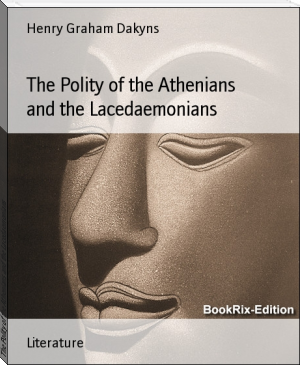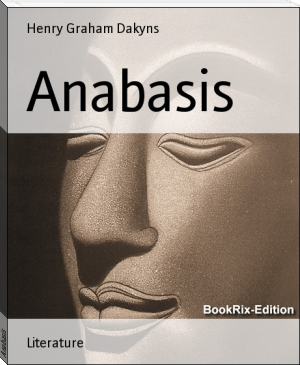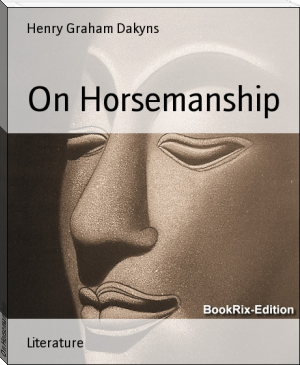Cyropaedia: the education of Cyrus - Henry Graham Dakyns (primary phonics .TXT) 📗

- Author: Henry Graham Dakyns
Book online «Cyropaedia: the education of Cyrus - Henry Graham Dakyns (primary phonics .TXT) 📗». Author Henry Graham Dakyns
for the mere sake of doing harm: at any rate, there is no country where deaths from poison are so common. [15] And the Persian to-day is far more luxurious than he was in the time of Cyrus. Then they still clung to the Persian style of education and the Persian self-restraint, merely adopting the Median dress and a certain grace of life. But now the old Persian hardihood may perish for all they care, if only they preserve the softness of the Mede. [16] I might give instances of their luxury. They are not content with soft sheets and rugs for their beds, they must have carpets laid under the bed-posts to prevent any jarring from the floor. They have given up none of the cooked dishes invented in former days; on the contrary, they are always devising new ones, and condiments to boot: in fact, they keep men for the very purpose. [17] In the winter it is not enough to have the body covered, and the head and the feet, they must have warm sleeves as well and gloves for the hands: and in the summer they are not content with the shade from the trees or the rocks, they must have servants standing beside them with artificial screens. [18] To have an endless array of cups and goblets is their special pride: and if these are come by unjustly, and all the world knows it, why, there is nothing to blush for in that: injustice has grown too common among them, and ill-gotten gain. [19] Formerly no Persian was ever to be seen on foot, but the sole object of the custom was to make them perfect horsemen. Now they lay more rugs on their horses' backs than on their own beds; it is not a firm seat they care for, but a soft saddle.
[20] As soldiers we may imagine how they have sunk below the ancient standard; in past times it was a national institution that the land-owner should furnish troopers from his own estate, and men were bound to go on active service, while the garrison troops in the country received regular pay; but now the Persian grandees have manufactured a new type of cavalry, who earn their pay as butlers and cooks and confectioners and cupbearers and bathmen and flunkeys to serve at table or remove the dishes, and serving-men to put their lords to bed and help them to rise, and perfumers to anoint them and rub them and make them beautiful. [21] In numbers they make a very splendid show, but they are no use for fighting; as may be seen by what actually takes place: an enemy can move about their country more freely than the inhabitants themselves. [22] It will be remembered that Cyrus put a stop to the old style of fighting at long range, and by arming men and horses with breastplates and giving each trooper a short spear he taught them to fight at close quarters. But nowadays they will fight in neither one style nor the other. [23] The infantry still carry the large shields, the battle-axes, and the swords, as if they meant to do battle as they did in Cyrus' day. [24] But they will never close with the enemy. Nor do they use the scythe-bearing chariots as Cyrus intended. By the honours he gave he raised the dignity and improved the quality of his charioteers till he had a body of men who would charge right into the enemy's ranks; but the generals of to-day, though they do not even know the charioteers by sight, flatter themselves that untrained men will serve their purpose quite as well as trained. [25] So the charioteers will dash off, but before they reach the enemy half the men have fallen from their boxes, and the others will jump out of their own accord, and the teams, left without their drivers, will do more harm to their friends than to their foes. [26] And since in their hearts the Persians of to-day are well aware what their fighting condition really is, they always give up the struggle, and now none of them will take the field at all without Hellenes to help them, whether they are fighting among themselves or whether Hellenes are in arms against them: even then it is a settled thing that they must have the aid of other Hellenes to face them.
[27] I venture to think I have shown the truth of the statement that I made. I asserted that the Persians of to-day and their allies are less religious than they were of old, less dutiful to their kindred, less just and righteous towards other men, and less valiant in war. And if any man doubts me, let him examine their actions for himself, and he will find full confirmation of all I say.
Imprint
[20] As soldiers we may imagine how they have sunk below the ancient standard; in past times it was a national institution that the land-owner should furnish troopers from his own estate, and men were bound to go on active service, while the garrison troops in the country received regular pay; but now the Persian grandees have manufactured a new type of cavalry, who earn their pay as butlers and cooks and confectioners and cupbearers and bathmen and flunkeys to serve at table or remove the dishes, and serving-men to put their lords to bed and help them to rise, and perfumers to anoint them and rub them and make them beautiful. [21] In numbers they make a very splendid show, but they are no use for fighting; as may be seen by what actually takes place: an enemy can move about their country more freely than the inhabitants themselves. [22] It will be remembered that Cyrus put a stop to the old style of fighting at long range, and by arming men and horses with breastplates and giving each trooper a short spear he taught them to fight at close quarters. But nowadays they will fight in neither one style nor the other. [23] The infantry still carry the large shields, the battle-axes, and the swords, as if they meant to do battle as they did in Cyrus' day. [24] But they will never close with the enemy. Nor do they use the scythe-bearing chariots as Cyrus intended. By the honours he gave he raised the dignity and improved the quality of his charioteers till he had a body of men who would charge right into the enemy's ranks; but the generals of to-day, though they do not even know the charioteers by sight, flatter themselves that untrained men will serve their purpose quite as well as trained. [25] So the charioteers will dash off, but before they reach the enemy half the men have fallen from their boxes, and the others will jump out of their own accord, and the teams, left without their drivers, will do more harm to their friends than to their foes. [26] And since in their hearts the Persians of to-day are well aware what their fighting condition really is, they always give up the struggle, and now none of them will take the field at all without Hellenes to help them, whether they are fighting among themselves or whether Hellenes are in arms against them: even then it is a settled thing that they must have the aid of other Hellenes to face them.
[27] I venture to think I have shown the truth of the statement that I made. I asserted that the Persians of to-day and their allies are less religious than they were of old, less dutiful to their kindred, less just and righteous towards other men, and less valiant in war. And if any man doubts me, let him examine their actions for himself, and he will find full confirmation of all I say.
Imprint
Publication Date: 12-09-2009
All Rights Reserved
Free e-book «Cyropaedia: the education of Cyrus - Henry Graham Dakyns (primary phonics .TXT) 📗» - read online now
Similar e-books:





Comments (0)